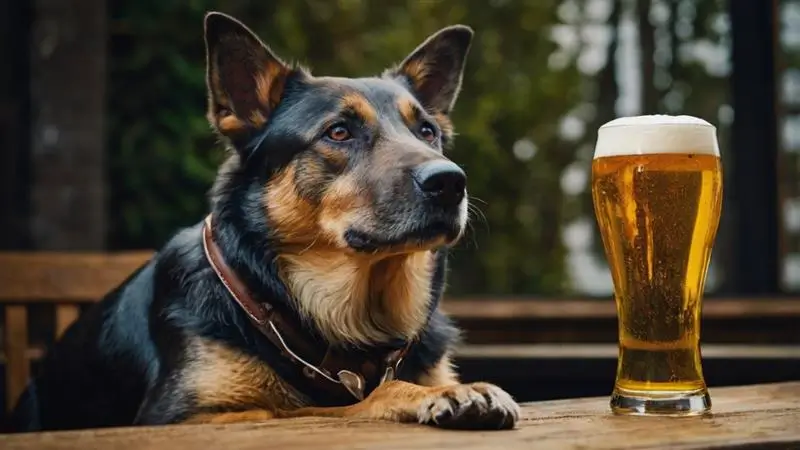Dog‑safe beer for dogs is not your typical lager. These specially formulated beverages are non‑alcoholic, hop‑free, and packed with pet‑safe ingredients like bone broth, herbs, and vegetables. They’re meant for hydration and enjoyment, not intoxication.
Lets discuss mlore about beer for dogs. Along with its benefits and health hazards. Moreover, you will find out about the beer names for dogs also.
Beer for Dogs: Is Beer Bad for Dogs? The Dangers of Human Beer
The short answer: Yes. Giving dogs human beer can be seriously dangerous.
- Alcohol toxicity: Even small amounts of ethanol can impair a dog’s central nervous system, reduce heart rate, and in severe cases, cause seizures or death
- Hops toxicity: Hops can trigger malignant hyperthermia in dogs, leading to fatal reactions
- Unexpected ingredients: Additives like chocolate, spices, or coffee in flavored beers can worsen toxicity
Even a single sip can cause vomiting, tremors, or disorientation. If your dog accidentally drinks beer, monitor for symptoms like vomiting, lethargy, and wobbliness. This can start within 30 minutes
Learn about the beautiful Shiba Inu Dog of Elon Musk. Explore the beauty and temperament of this celebrity dog
Beer for Dogs: Is Beer Good for Dogs? Why Dog Beers Can Be Safe and Healthy
While alcoholic beer is harmful, dog beer is carefully crafted:
- Non‑alcoholic: Uses water or broth instead of fermented malt.
- Herb‑based formulas: Includes dandelion, burdock, bladderwrack, nettle, and rooibos. Rich in iron, iodine, vitamins, and antioxidants
- Functional benefits: Bone broth provides minerals like magnesium and calcium; vegetables offer vitamins. Some brands even add glucosamine for joint health
- Hydration-friendly: These drinks are fluid, sometimes poured over food to encourage hydration.
Example of Beer for Dogs: Woof & Brew Bottom Sniffer Beer
- Alcohol-free, non‑carbonated, UK‑made
- Contains bladderwrack and nettle for coat health; dandelion and burdock for wellbeing; rooibos for antioxidants
- High 96% palatability with natural ingredients and no artificial additives
- Suitable for all dogs older than four months
Beer Names for Dogs: What to Look For
Popular beer names for dogs usually include terms like “beer,” “brew,” or “ale,” while emphasizing their dog-safe features:
- Bottom Sniffer Beer (Woof & Brew): Herbal, broth‑based, non-alcoholic.
- Fetch Canine Pale Ale and Unleashed Hydrating Energy Brew: Include bone broth, unsalted beef, and hydration-focused ingredients
- Busch Dog Brew (Turkey & Pork): Uses bone broth, sweet potato, herbs. No hops or alcohol
When selecting, ensure:
- No alcohol, hops, or fermentation.
- Ingredients from reputable sources, ideally developed with vets.
Explore the German Shepherd dog of Joe and Jill Biden named Commander. Discover its eye-catching personality and temperaments.
Beer for Dogs: Is Beer Good or Bad for Dogs? Balanced Insight
- Alcoholic beer = bad. It’s unsafe, toxic, and unnecessary.
- Dog beer = good, in moderation. It can serve as a treat with added health benefits, but should complement, not replace, water and food
Beer for Dogs: Health Perks of Non‑Alcoholic Dog Beer
- Targeted hydration: The high water content is great after walks or play.
- Nutrient boost: Broth brings electrolytes; herbs supply vitamins and antioxidants.
- Joint health: Glucosamine-enriched versions exist
- Encourages picky eaters: Can be poured over dry kibble to increase palatability.
How to Give Dog Beer Safely
- Moderation: Follow brand guidelines—typically one bottle per day, less for small dogs.
- Serve appropriately: Use a bowl to avoid ma ess.
- Complement meals: It shouldn’t replace balanced food or water.
- Vet consultation: Especially if your dog has allergies, conditions, or weight issues.
Are you interested in beautiful and loyal dog breeds? Then explore the heart-winning personality of the Catahoula Leopard Dog mix.
Real-World Experiences
On Reddit, one pet owner shared alarming results:
“Alcohol is not the main concern. Hops are very toxic for dogs and can cause hyperthermia. Just make sure he does not start feeling too warm.” Although hop poisoning is rare, the risk is serious and irreversible.
Beer for Dogs: Buying Tips For Pet Owners
- Read ingredients for herb inclusion and alcohol absence.
- Research reviews for palatability and safety.
- Check vet endorsements or packages stating “developed with veterinary experts.”
- Try single bottles before committing to multipacks.
Should You Use Beer Names for Marketing?
If you produce or sell dog beer, using catchy beer names for dogs is smart. It plays on familiarity while clarifying the product’s nature (e.g., “Pup Pale Ale” with bone broth).
1. Effective Marketing Strategies
- Highlight non-alcoholic, hop-free status.
- Emphasize natural, vet-approved ingredients.
- Features health benefits backed by nutrition.
- Showcase fun dog‑friendly branding for social media shareability.
Learn about the loving and adorable breed of the Australian Shepherd Mix. Explore its personality and temperaments here
Final Words on Beer for Dogs
Human beer is metabolically unsafe for dogs. Alcohol and hops can cause serious illness or death. Conversely, dog-friendly beer for dogs offers a healthy, hydrating, flavorful treat. Used responsibly, it’s a fun addition to pet wellness routines.
By understanding is beer bad for dogs vs. is beer good for dogs, learning about beer names for dogs, and following safety guidelines, pet owners can make informed choices that put canine health first.
FAQs
- Is beer bad for dogs?
Yes. Human beer contains alcohol and hops, both extremely toxic to dogs. Even a small amount can lead to poisoning symptoms.
- Can dogs safely drink dog beer?
Yes, dog-specific beers are alcohol‑free, hop‑free, and often include healthy ingredients like bone broth and herbs. Serve in moderation.
- What are popular beer names for dogs?
Trends include “Bottom Sniffer Beer,” “Fetch Canine Pale Ale,” and Busch Dog Brew variants like Turkey Brew. These highlight novelty and safety.
- How much dog beer should I give my pup?
Typically, one 300–330 mL bottle per day is sufficient for medium to large dogs. Smaller breeds should get smaller portions. Always follow the product’s guidelines.
- What if my dog licks human beer accidentally?
Monitor closely. If it’s only a lick, your dog may remain symptom‑free. However, watch for signs of vomiting, lack of coordination, or changes in breathing, and consult a veterinarian immediately.








